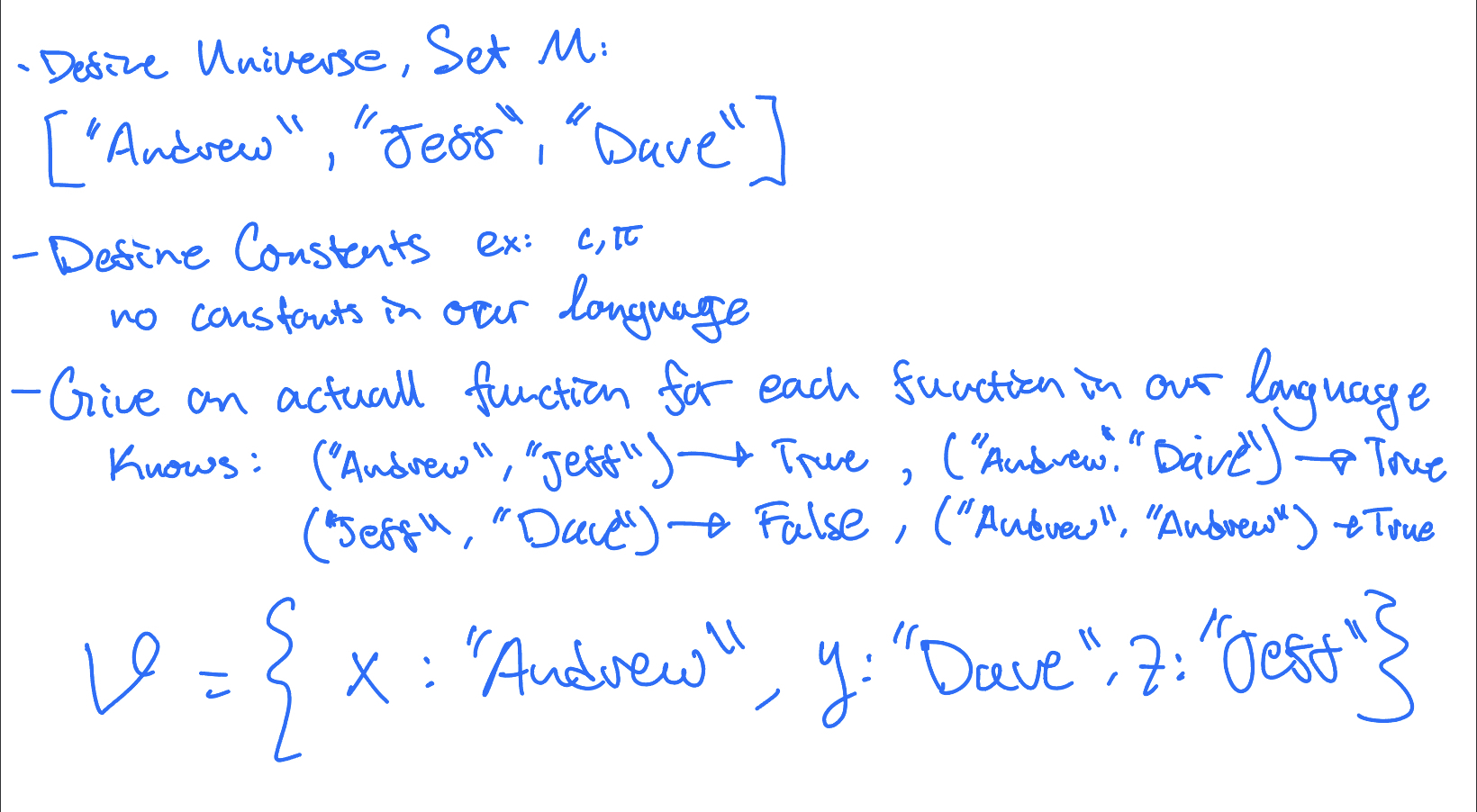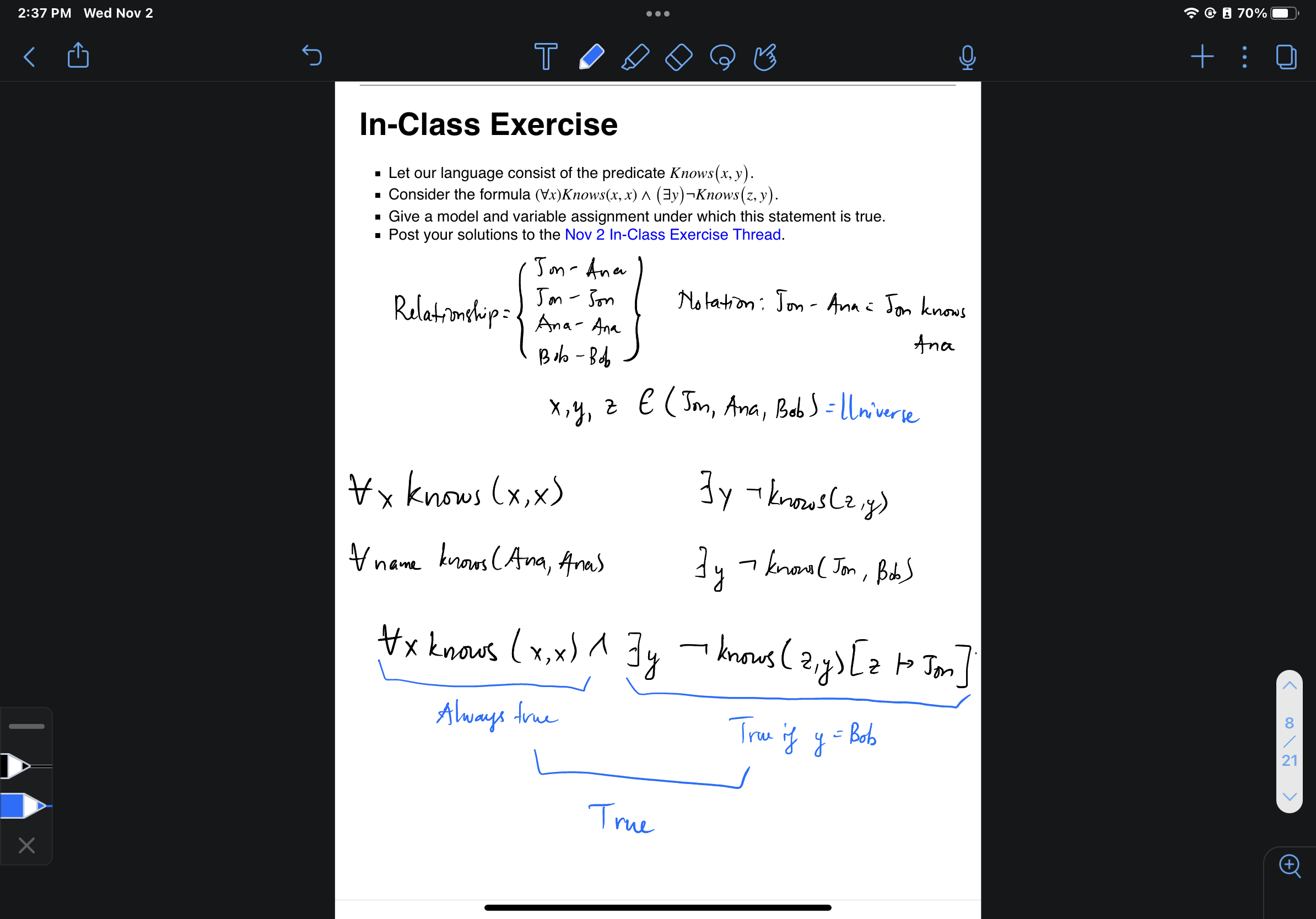2022-11-01
Nov 2 In-Class Exercise Thread .
Please post your solutions to the Nov 2 In-Class Exercise to this thread.
Best,
Chris
Please post your solutions to the Nov 2 In-Class Exercise to this thread.
Best,
Chris
2022-11-02
Universe = Domain: a, b, c, d Knows(a,a) Knows(b,b) Knows(c,c) Knows(d,d) Knows(a,b) Knows(b,c) Knows(a,d)
x -> a, y-> d, z->b For_All(x) Knows(x,x) AND Exists(y)not Knows(z,y)
Universe = Domain: a, b, c, d
Knows(a,a)
Knows(b,b)
Knows(c,c)
Knows(d,d)
Knows(a,b)
Knows(b,c)
Knows(a,d)
x -> a, y-> d, z->b
For_All(x) Knows(x,x) AND Exists(y)not Knows(z,y)
Let universe U = {"PersonA", "PersonB", "PersonC", "PersonD"}
Knows := {("PersonA", "PersonA"), ("PersonB", "PersonB"), ("PersonC", "PersonC"}, ("PersonD","PersonD")}
F := (∀x)Knows(x,x)∧(∃y)¬Knows(z,y)[z -> "PersonB"]
T ¬Knows(z,y)[z -> "PersonB", y -> "PersonA"]
F
T
(Edited: 2022-11-02) Let universe U = {"PersonA", "PersonB", "PersonC", "PersonD"}
Knows := {("PersonA", "PersonA"), ("PersonB", "PersonB"), ("PersonC", "PersonC"}, ("PersonD","PersonD")}
F := (∀x)Knows(x,x)∧(∃y)¬Knows(z,y)[z -> "PersonB"]
T ¬Knows(z,y)[z -> "PersonB", y -> "PersonA"]
F
T
Consider the model M with universe {Tyrell's Secret, Jim's Secret}
Knows := {(Tyrell's Secret,Tyrell's Secret),(Jim's Secret,Jim's Secret)}
M |= (∀x)Knows(x,x)∧(∃y)¬Knows(z,y) [z->Jim's Secret]
M |= (∀x)Knows(x,x)∧(∃y)¬Knows(z,y) [y->Tyrell's Secret, z->Jim's Secret]
(Edited: 2022-11-02) Consider the model M with universe {Tyrell's Secret, Jim's Secret}
Knows := {(Tyrell's Secret,Tyrell's Secret),(Jim's Secret,Jim's Secret)}
M |= (∀x)Knows(x,x)∧(∃y)¬Knows(z,y) [z->Jim's Secret]
M |= (∀x)Knows(x,x)∧(∃y)¬Knows(z,y) [y->Tyrell's Secret, z->Jim's Secret]
Knows(x,y)
U = {A, B}
(∀x)Knows(x,x)[x = (A, A), (B, B)] <=> True
(∃y)¬Knows(z,y)[z = A, y = B] <=> True
(∀x)Knows(x,x)∧(∃y)¬Knows(z,y) <=> True
Knows(x,y)
U = {A, B}
(∀x)Knows(x,x)[x = (A, A), (B, B)] <=> True
(∃y)¬Knows(z,y)[z = A, y = B] <=> True
(∀x)Knows(x,x)∧(∃y)¬Knows(z,y) <=> True
(∀x)Knows(x,x) ∧ (∃y)¬Knows(z,y) Domain: (Alice, Bob, Cali) Knows: (Alice, Alice), (Bob, Bob), (Cali, Cali) Right side evaluates to true if we set it's variables to (Bob, Alice) or (Alice, Bob) or (Bob, Cali) or (Alice, Cali) or (Cali, Bob) or (Cali, Alice)
(∀x)Knows(x,x) ∧ (∃y)¬Knows(z,y)
Domain: (Alice, Bob, Cali)
Knows: (Alice, Alice), (Bob, Bob), (Cali, Cali)
Right side evaluates to true if we set it's variables to (Bob, Alice) or (Alice, Bob) or (Bob, Cali) or (Alice, Cali) or (Cali, Bob) or (Cali, Alice)
Predicate: Knows(X, Y)
Model: M = {“Alice”, “Bob”, “Dave”}
Knows(“Alice”, “Alice”)
Knows(“Bob”, “Bob”)
Knows(“Dave”, “Dave”)
Formula: (∀x)Knows(x,x)∧(∃y)¬Knows(z,y)
Variable Assignment: x -> “Dave”, Y -> “Alice”, Z -> “Bob”(Edited: 2022-11-02)
Predicate: Knows(X, Y)
Model: M = {“Alice”, “Bob”, “Dave”}
Knows(“Alice”, “Alice”)
Knows(“Bob”, “Bob”)
Knows(“Dave”, “Dave”)
Formula: (∀x)Knows(x,x)∧(∃y)¬Knows(z,y)
Variable Assignment: x -> “Dave”, Y -> “Alice”, Z -> “Bob”
(∀x)Knows(x,x) ∧ (∃y)¬Knows(z,y)
Universe = ["John", "Peter", "Bob"]
(∀x)Knows(x,x) := {["John", "John"], ["Peter", "Peter"], ["Bob", "Bob"]} = T
(∃y)¬Knows(z,y) := [z = "John", y = "Peter"] = T
(∀x)Knows(x,x) ∧ (∃y)¬Knows(z,y) = T
(∀x)Knows(x,x) ∧ (∃y)¬Knows(z,y)
Universe = ["John", "Peter", "Bob"]
(∀x)Knows(x,x) := {["John", "John"], ["Peter", "Peter"], ["Bob", "Bob"]} = T
(∃y)¬Knows(z,y) := [z = "John", y = "Peter"] = T
(∀x)Knows(x,x) ∧ (∃y)¬Knows(z,y) = T
(c) 2026 Yioop - PHP Search Engine



